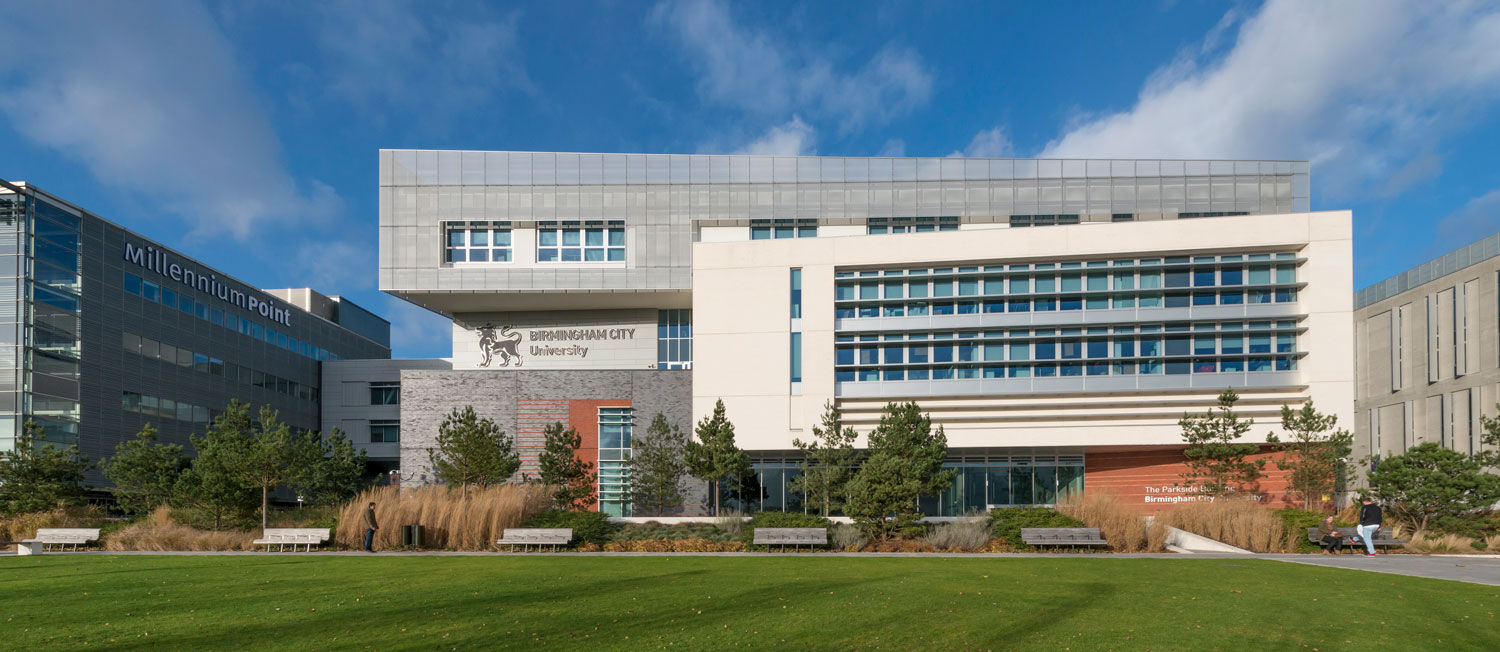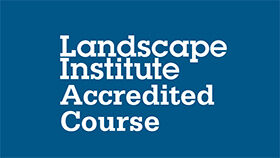Landscape Architecture - MA
Currently viewing course to start in 2024/25 Entry. Switch to 2025/26 Entry
This forward looking and innovative MA Landscape Architecture course offers you the opportunity to further your career as a professional landscape architect and give the first steps to become a Chartered Landscape Architect....
- Level Postgraduate Taught
- Study mode Full Time/Part Time
- Award MA
- Start date January 2025
- Fees View course fees
- Subject
- Location City Centre
This course is:
Open to International Students
Overview
This forward looking and innovative MA Landscape Architecture course offers you the opportunity to further your career as a professional landscape architect and give the first steps to become a Chartered Landscape Architect.
The MA Landscape Architecture course provides you with opportunities to explore responses to climate change emergency and biodiversity loss, and help in planning and designing meaningful, fair and resilient landscapes, places and communities of the future. Exploring these themes and issues is central to our common future and our Landscape Architecture course is very well placed to build employability skills that will position you at the forefront of these subjects.
The course stimulates a design studio culture and encourages high levels of research, design innovation, creativity and distinct ownership of ideas and concepts. We put an emphasis on contemporary practice and real-world projects aligned to develop the critical integration of theory and practice across scales, from landscape planning to master planning to detail design.
We invite applications from students with an undergraduate degree in Landscape Architecture or an international equivalent.
Note: If your degree is in an unrelated field and you are seeking a Conversion Master's, please view our two-year MLA Landscape Architecture option.
What's covered in this course?
This course is professionally oriented. You will build on existing knowledge and skills acquired in your Landscape Architecture degree and further develop creative, artistic, technical and intellectual abilities through a diverse range of design projects that explore contemporary issues and problems, which grow in scale and complexity. The format of studio learning is continued with an increased emphasis on research and experimentation. Design themes include research-led design projects relating to landscape health and wellbeing, habitat creation and biodiversity, climate change, settlement design and food security as well as large infrastructure schemes like High Speed 2 (HS2) and the West Midlands National Park. The landscape as a sequence of interrelated designed environments provides the scope for a design laboratory connected by land, ecology, water, climate and infrastructure, linked to a cultural context that extends from parish to global political and economic systems.
Our modules, including our new Design for Climate Change module, provide a fascinating forum for systems scale interventions, innovation and exploration of new sustainable approaches to respond to the climate change emergency, imaginative solutions to extreme weather events, biodiversity loss and for the planning and designing of ecologically inspired places and communities.
Our links to industry, local authorities and our Co.Lab partners offer an opportunity for you to be involved in the complex nature and challenges of being a landscape architect in the real world. These extend to collaborating with local stakeholders and institutions, and working alongside colleagues across the University on projects that demonstrate the authority of Landscape Architecture in improving the quality of future urban and rural living.
The Professional Placement version of the course is optional and is offered as an alternative to the standard version of the course. This will allow you to complete a credit bearing, 20-week Professional Placement as an integral part of your Master’s Degree. The purpose of the Professional Placement is to improve your employability skills which will, through the placement experience, allow you to evidence your professional skills, attitudes and behaviours at the point of entry to the postgraduate job market. Furthermore, by completing the Professional Placement, you will be able to develop and enhance your understanding of the professional work environment, relevant to landscape architecture, and reflect critically on your own professional skills development within the workplace.
Employment opportunities and flexible learning
Our postgraduate course has been running for over 60 years which means that over this time a well-established employer network has evolved with former students setting up nationally renowned consultancies representing all levels of the profession from director to associate landscape architect. We have very strong links with local, regional and national employers and through this you will be able to take advantage of these extensive relationships.
Many of our students opt to work in practice and study part-time after year one. To help balance the MA with your existing commitments, we have structured the course to provide some flexibility so that you have the option to complete the MA by dedicating two days a week over one year or one day a week over two years.
Professional standards
Each year, the course is assessed to evaluate how it meets the accreditation standards set by the Landscape Institute; in particular, how the curriculum prepares employment-ready students. To ensure academic rigor and creative flair is maintained, the course is reviewed annually by External Examiners.
Our Master’s courses are fully accredited by the Landscape Institute and recognised by the International Federation of Landscape Architects. We are also an active member of the European Council of Landscape Architecture Schools.
Research
Landscape architecture academics at Birmingham City University have partnered with a number of organisations, including West Midlands Combined Authorities, to establish a national park for the West Midlands that provides multiple benefits to the city, the landscape and its inhabitants.
Accredited By
This course is accredited by:
My time at BCU has given me a really wide range of skills that I continue to use every day, everything from the initial stages of the design, graphic skills to client presentations and public speeches. I have recently written a book and believe my time here has really helped me with gaining literary skills to be able to do it.
Ula Maria
Amrutha Chempaliputhenpurayil Raj
Amrutha embarked on a transformative journey, transitioning from her hometown in India to pursuing her passion for architecture in Birmingham. She is now an award-winning student, finally living out her dream as a landscape architect.
Read in fullWhy Choose Us?
- Our MA Landscape Architecture course is accredited by the Landscape Institute and worldwide by the International Federation of Landscape Architects, giving you a good start on becoming a Chartered Landscape Architect.
- We provide a rich and unique teaching and learning experience working in partnership with practitioners, our internationally renowned academics and our dedicated students.
- Our modules push the boundaries of national and international possibilities for Landscape Architecture. Our Design for Climate Change module helps you develop employability skills that will position you at the forefront of finding design based solutions to the threats on our planet Earth.
- Our flexible modes of learning ensures you can balance your personal life and existing commitments and facilitates opportunities to work while you study. Some of our current students work for Fira, Wardell Armstrong, Define, RPS consulting, IDP, Pegasus and Camlins.
- You will benefit from our excellent links and extensive network of local, regional and national practices and employers to support you to find your career path.
OPEN DAY
Join us for a virtual Open Day where you'll be able to learn about this course in detail. Booking isn't open yet for this event, register your interest and we’ll email you as soon as booking goes live.
Next Event: 5 February 2025
Entry Requirements
Essential requirements
Essential Requirements
| Essential | ||
|---|---|---|
|
BA Hons / BSc degree in Landscape Architecture, Garden Design or overseas equivalent, minimum Lower Second-Class (2:2). If your degree is in an unrelated field, view our two-year MLA Landscape Architecture option. |
||
|
Applicants will also need to submit a good portfolio |
||
|
IELTS 6.0 overall with 5.5 minimum in all bands or its equivalent. |
International students must meet all the Border Agency entry criteria for the programme.
If you have a qualification that is not listed, please contact us.
Fees & How to Apply
UK students
Annual and modular tuition fees shown are applicable to the first year of study. The University reserves the right to increase fees for subsequent years of study in line with increases in inflation (capped at 5%) or to reflect changes in Government funding policies or changes agreed by Parliament. View fees for continuing students.
Award: MA
Starting: Jan 2025
- Mode
- Duration
- Fees
- Full Time
- 1 year
- £8,925 in 2024/25
- Full Time
- 18 months (including Professional Placement - see below*)
- £9,820 in 2024/25
- Part Time
- 2 years
- Show fees
- £992 per 20 credits
- Year 1 - 80 credits
- Year 2 - 100 credits
Fees for Part-time students
This course can be studied on a Part-time study basis. The cost per year of study is based on credit requirements for that year.
International students
Annual and modular tuition fees shown are applicable to the first year of study. The University reserves the right to increase fees for subsequent years of study in line with increases in inflation (capped at 5%) or to reflect changes in Government funding policies or changes agreed by Parliament. View fees for continuing students.
Award: MA
Starting: Jan 2025
- Mode
- Duration
- Fees
- Full Time
- 1 year
- £17,710 in 2024/25
- Full Time
- 18 months (including Professional Placement - see below*)
- £19,485 in 2024/25
Portfolio guidance
If you receive an offer to study this course, you will be required to submit a portfolio. We ask that this is submitted within four weeks of receiving your offer.
Please see our portfolio guidance page for tips on putting your portfolio together.
Portfolio guidance
If you receive an offer to study this course, you will be required to submit a portfolio. We ask that this is submitted within four weeks of receiving your offer.
Please see our portfolio guidance page for tips on putting your portfolio together.
Personal statement
You’ll need to submit a personal statement as part of your application for this course. This will need to highlight your passion for postgraduate study – and your chosen course – as well as your personal skills and experience, academic success, and any other factors that will support your application for further study.
If you are applying for a stand alone module, please include the title of the module you want to study in your Personal Statement.
Not sure what to include? We’re here to help – take a look at our top tips for writing personal statements and download our free postgraduate personal statement guide for further advice and examples from real students.
Course in Depth
MA
In order to complete this course a student must successfully complete all the following CORE modules (totalling 180 credits):
The purpose of this module is to introduce the student to the contemporary issues and challenges that landscapes and the built environment are facing. This studio project consists of a number of exercises, undertaken as part of one overall project, that explore the design process by considering design as an analytical, artistic, observant and interpretative activity.
This module provides a fascinating theatre for innovation and exploration of sustainable and new approaches to deal with climate change, biodiversity loss and resilience. You will research the issues and opportunities to inform the design for climate change considering a range of scales as well as the political, economic, social and physical/environment parameters that effect this geographical sphere. According to the Landscape Institute, “professions that best understand the built and natural environments will be best placed to tackle climate change”.
The module is an opportunity to learn and critically reflect on the skills of collaboration. Collaboration is a vital employability skill within the Creative Industries and this module allows you to develop these skills, making use of University facilities, with the support of academic staff. Within this module framework, several kinds of collaborative opportunities are available. Your supervisor may set you a predetermined live project, to enable you to work with other students in a way that is appropriate to your subject area; or there may be opportunities for you to collaborate with staff on research projects. In all cases, you must apply your subject skills to a project which will be agreed in advance with your supervisor.
This module applies and develops the skills and knowledge developed in the design process studio to the research and analysis of detailed design, exploring how ideas can be expressed spatially and visually through the selection and design of hard and soft materials. Contributing to a research strategy that aims to move design issues in landscape architecture away from a purely technical approach towards a conceptually driven and challenging practice, the module connects into the realm of cultural and contextual issues. Increasing complexity, design skill and knowledge of the materiality of the discipline. You will investigate case studies and critically evaluate landscape as the generative influence on the spatial form of the design. Building up knowledge of different perspectives, contextual and trans-disciplinary knowledge students investigate and respond to a contemporary issue such as inclusive design.
The thesis design project is a comprehensive and wide ranging project which is designed to enable you to demonstrate the standards identified in the Master’s level QAA Benchmark Statement. You will engage with the growing international debate around the need to develop new approaches to spatial design, driven by the recognition that the socio-economic benefits of adopting holistic, artistic, ecological and conceptual approaches to master planning and regeneration. This is becoming increasingly evident and are regarded as essential if we are to respond to the challenges of natural resource shortage ("peak oil", water, etc.), climate change adaptation and mitigation, unprecedented urban growth, Health and well-being and a changing economy.
Download course specification
Download nowThe course is taught through design studios with research embedded throughout. The assessment process is by coursework which includes design portfolios and research papers. We feel that this best simulates the way you'd work in the real world and so better prepares you for a career in landscape architecture.
Your studies are supported by a series of lectures and workshops delivered by renowned landscape practitioners and educators from the UK and overseas. We continue to develop our International Landscape Architecture Lecture Series and have recently welcomed Martha Schwartz (US), Bruno Marques (New Zealand), Paulo Farinha Marques (Portugal), Nick Grayson, Ian Lanchbury and Jane Findlay (UK).
Field trips ensure you will have experiential learning and hands-on knowledge about historic and contemporary landscapes and the built environment.
The City Centre Campus Parkside Building captures the magical spirit of the Bauhaus, and gives you access to industry standard facilities, including digital studios, 3D design workshops, wood and metal workshops, ceramics and glass workshops, 3D printing, laser cutting, water jetting, film, tv and photography studios.
What current students say about the course

Helen Young
This course is accredited by the following organisation:

Landscape Institute
Our course is accredited by the Landscape Institute. LI accreditation requires education providers to meet important criteria which ensure high standards are maintained, meaning you can be sure your course meets the standards needed for you to enter the landscape profession.
Employability
Enhancing your employability skills
This MA Landscape Architecture course aims to provide graduates with a set of attributes which prepare them for their future careers. You will be able to:
- Produce complex design proposals understanding the current global professional issues and contemporary Landscape Institute policy.
- Gain confident skills and knowledge as a designer to respond to the issues of Climate Change which will position you at the forefront of these subjects.
- Work on live projects, and with real clients, with confidence.
- Work independently and collaboratively in multi-disciplinary environments.
- Be a creative thinker to solve problems in wider professional contexts.
- Negotiate, plan and communicate your designs to a professional standard.
- Work with Industry standard IT, e.g. AutoCAD, Vectorworks, Adobe Suite, Edina Digimap, and other digital modelling.
Graduate jobs and links to industry
We have an established relationship with an extensive network of local, regional and national practices and employers. The reputation of the landscape architecture courses provides a head start for applicants.
Our students enjoy excellent employment opportunities during and after completing the course. Recent graduates are working for an extensive range of practices, including: AHR Global, AECOM, Arup, Atkins Global, BMD Bradley Murphy Design, Camlins Associates, Capita, Define, Fira, FPCR, IDP, LDA Design, Land Use Consultants, Node Urban Design, Liz Lake Associates, Townscape, Pegasus Planning, WSP, Randall Thorp.
There is a clear structure to achieving Chartership status of the Landscape Institute. Recently employed graduate members of the profession are on the ‘Pathway to Chartership’. These are mentored roles in which ‘Associates’ are involved in site mapping and survey work, design development work and supporting the project team in all aspects of the design process.

Maryam Gohari
Graduate
International
Birmingham City University is a vibrant and multicultural university in the heart of a modern and diverse city. We welcome many international students every year – there are currently students from more than 80 countries among our student community.
The University is conveniently placed, with Birmingham International Airport nearby and first-rate transport connections to London and the rest of the UK.
Our international pages contain a wealth of information for international students who are considering applying to study here, including:
- Details of the entry requirements for our courses
- Some of the good reasons why you should study here
- How to improve your language skills before starting your studies
- Information relevant to applicants from your country
- Where to find financial support for your studies.
Our international students
Our international reputation, professional accreditation and outstanding graduate success rate attracts students from the UK, Europe and South East Asia.

Candice Ying Wei
Candice Ying Wei is applying the knowledge from her Master's in her job as an Assistant Landscape Architecture in Atelier Dreiseitl in Beijing just months after graduating.

Chi Ma
(Hong Kong)
Facilities & Staff

Our Facilities
When you join Birmingham City University, the first thing you will notice is the exceptional quality of our campuses. With an investment of over £400 million across our buildings and facilities, we are committed to giving you the very best learning environment to help shape your experience.
You will be based in our multi-million pound Parkside building – a state of the art facility located within our City Centre Campus. Here you will have full access to our recently upgraded, high spec CAD (Computer-Aided-Design) workstations situated within our dedicated computer labs and open access areas. We also provide access to leading edge digital design software, enabling you to explore technical drawing, graphics, 3D modelling, visualization, animation, computation, simulation, and virtual reality.
The Parkside Building is also home to our digital fabrication labs, where you will be able to explore 3D printing, laser cutting, CNC machining, ceramics, glass and traditional model-making, guided by our team of expert technicians with access to our on-site material store, and professional printing facilities.
You’ll also benefit from:
- Design studios
- Physical and digital library
- Loanable laptops
- Dedicated social spaces
- Cafés
Photo Gallery
From industry-standard software, to our workshops and studio spaces, everything you need will be at your fingertips from day one. Working with our dedicated teaching teams and expert technicians, you'll be supported from concept through to completion.
Our staff
Dr Sandra Costa
Academic lead for Landscape Architecture & Course Director MA Landscape Architecture
Sandra is a lecturer and researcher in landscape architecture and design with diversified experience encompassing teaching, research and professional practice. She has lectured in the UK and Portugal in undergraduate and postgraduate courses. Her teaching explores current issues and challenges faced by landscapes and the built environment, to...
More about SandraRussell Good
Senior Lecturer in Landscape Architecture, Deputy Course Director MA Landscape Architecture
Russell Good is a Senior Lecturer in Landscape Architecture, Deputy Course Director of MA Landscape Architecture; a landscape architect, graphic designer and keen mountain biker. Russell’s research explores ecological and hydrological systems in the context of climate change, in order to inform and develop new aesthetic codes in landscape design.
More about RussellKristina Hill
Visiting Professor
Kristina Hill is an associate professor at the University of California, Berkeley. An international expert in urban ecology and hydrology in relationship to physical design and social justice issues, her current work is focused on adapting urban districts and shorezones to the new challenges associated with climate change. After Hurricane Katrina...
More about KristinaMichael Schwarze-Rodrian
Visiting Professor
Michael Schwarze-Rodrian is a German landscape planner who has combined innovative landscape design with structural change in regional, urban and industrial developments in the Ruhr Region since the mid 1980s. He developed and moderated the Emscher Landscape Park (ELP) as a regional park-system. Until recently he was the Director of the Department...
More about MichaelMartha Schwartz
Visiting Professor
Martha Schwartz has an extensive background in academia, until recently she was a tenured Professor in Practice at the Harvard University Graduate School of Design, a position she held for 16 years until her retirement. She is a landscape architect, urbanist, and climate activist. Her work and teaching focus on the urban public realm landscape and...
More about Martha





























